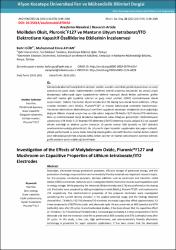Molibden oksit, pluronic®F127 ve mantarın lityum tetraborat/ITO elektrotların kapasitif özelliklerine etkilerinin incelenmesi
Citation
Gür, B , Ayhan, M . (2021). Molibden Oksit, Pluronic®F127 ve Mantarın Lityum tetraborat/ITO Elektrotların Kapasitif Özelliklerine Etkilerinin İncelenmesi . Afyon Kocatepe Üniversitesi Fen ve Mühendislik Bilimleri Dergisi , 21 (1) , 196-208 . DOI: 10.35414/akufemubid.870456Abstract
Günümüzde alternatif enerji üretim süreçleri, üretilen enerjinin verimli bir şekilde depolanması ve enerji kaynaklarının çevre dostu malzemelerden üretilmesi önemli araştırma konularıdır. Bu amaçla enerji depolamada kullanılacak süper kapasitörlerde elektrot materyali olarak iletken polimerler, grafite alternatif mantar gibi biyokütle katkıları ve geçiş metal oksitleri (GMO) elektrokimyasal olarak araştırılmıştır. Elektrot hazırlarken lityum tetraborat (LTB) doping tuzu olarak tercih edilmiştir. LTB’ye sırasıyla molibden oksit (MoO3), Pluronic®F127 ve mantar katkılanarak elektrotlar hazırlanmıştır. Hazırlanan elektrotların elektrokimyasal özellikleri uygulanan potansiyel aralığındaki akım yoğunluğu değişimi dikkate alınarak araştırılmış ve elde edilen bulgular LTB-MoO3-F127-Mantar/ITO elektrotun daha iyi elektrokimyasal enerji depolama kapasitesine sahip olduğunu göstermiştir. Elektrokimyasal çalışmalarda LTB-MoO3-F127-Mantar/ITO elektrotta LTB/ITO elektrota kıyasla yaklaşık 3,5 kat kapasitif etkinin artırıldığı ve elektrot çevrim ömrünün 20 çevrim sonrası %86 (anodik) ve %87 (katodik) oranlarında korunduğu gösterilmiştir. Bu çalışma ile süper kapasitör uygulamaları için uygun maliyetli, yüksek performanslı ve çevre dostu teknoloji olarak grafite alternatif önerilen mantar-karbon tabanlı anot teknolojisi geliştirmek amacıyla GMO, iletken polimer ve mantar katkılamasının optimize edilerek grafit anotların yerini alabileceği önerilmiştir. Nowadays, alternative energy production processes, efficient storage of generated energy, and the production of energy resources from environmentally friendly materials are important research topics. For this purpose, conductive polymers, biomass additives such as mushroom and transition metal oxides (GMO) as electrode materials were investigated electrochemically towards supercapacitors used in energy storage. While preparing the electrode, lithium tetraborate (LTB) was preferred as the doping salt. Electrodes were prepared by adding molybdenum oxide (MoO3), Pluronic®F127, and mushroom to LTB, respectively. The electrochemical properties of the prepared electrodes were investigated considering the current density variation in the applied potential range, and the findings obtained showed that LTB-MoO3-F127-Mushroom/ITO electrode increased capacitive effect approximately 3.5 times compared to LTB/ITO electrode, and electrode cycle life was preserved at 86% (anodic) and 87% (cathodic) rates after 20 cycles. In electrochemical studies, it has been shown that the capacitive effect of LTB-MoO3-F127-Mushroom/ITO electrode is increased approximately 3.5 times compared to LTB/ITO electrode and that the electrode cycle life is preserved at 86% (anodic) and 87% (cathodic) rates after 20 cycles. In this study, a low cost, high performance, and environmentally friendly alternative technology is presented for super capacitor applications. It has been shown that the developed mushroom-carbon-based anode technology can replace graphite anodes by optimizing GMO, conductive polymer, and mushroom doping.
Source
Afyon Kocatepe Üniversitesi Fen ve Mühendislik Bilimleri DergisiVolume
21Issue
1URI
https://dergipark.org.tr/tr/pub/akufemubid/issue/60443/870456https://doi.org/10.35414/akufemubid.870456
https://hdl.handle.net/11630/8973
Collections
- Cilt 21 : Sayı 1 [21]



















